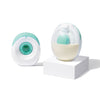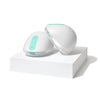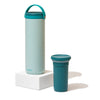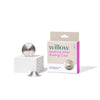If you plan to breastfeed your baby, it's best to start preparing before they're born! While breastfeeding is a natural thing, there can be a learning curve to it. Equipping yourself with essential information and supplies makes the process easier once the baby arrives.
Learn About Breastfeeding
Look for credible resources (books, websites, and apps) and learn about the benefits of breastfeeding, available alternatives, breastfeeding positions (football position, cross-cradle position, laid back, side-lying position, sling nursing, etc.), and possible challenges that can occur. The goal is not to scare yourself, but to equip yourself with enough knowledge that you feel prepared for your breastfeeding journey.
Lean on the other mothers and medical professionals in your life! Talk with your OBGYN or midwife about lactation support services available to you, even before your baby is born. The more you know, the better! Many hospitals offer classes that walk through the essentials of breastfeeding and can answer many of the questions you and your partner have.
Create Your Plan
Do you plan to nurse through exclusive pumping, combined, or exclusive breastfeeding? Decide on your breastfeeding option, then create a plan to suit it.
For instance, if you plan to return to work, will you pump at work and send bottles home or to the daycare? Where you plan to pump (exclusively at home or at home and outside the home) can affect the type of breast pump you need to buy.
If you plan to return to work after giving birth, you may need to talk to your employer about reserving a private space to pump. Also, choose a baby-friendly hospital with a birth center to benefit from their supportive breastfeeding environment.
Learn about Breast Milk and Milk Supply
Taking time to learn about breast milk and milk supply ensures you're ahead of the game and avoid making mistakes that might compromise your milk production.
Your body can produce the milk your baby needs naturally. But the supply increases with demand, meaning the more the baby breastfeeds, the more milk the body produces and vice versa. As such, some factors that can affect the milk supply such as feeding by the clock, topping up breast milk with formula, introducing dummies, and being away from your baby.
If you're not producing enough breast milk, you can increase by:
- Letting the baby feed on demand as opposed to set feeding times
- Holding the baby skin-to-skin to trigger the milk production
- Massaging your breasts
Essentially, milk production begins during pregnancy. You can start collecting colostrum before the baby comes but read below on the dos and don'ts. Your baby should start feeding within the first or two hours after birth. The milk production increases within the next few days and your breasts may feel firmer and fuller.
Each time the baby feeds, or you express, your body produces more milk to maintain the supply. After the sixth week, your breasts might stop leaking as the body settles into producing milk that meets the baby's demands. In most cases, their feeding needs at this point might remain constant, but they might start feeding for longer though less frequently, as they grow.
On the same note, consider learning the signs to look for to know whether a baby is getting enough milk. For instance, they might come off the breast themselves or look satisfied after feeding. How frequently they wet their diapers can also indicate whether they're feeding well.
Willow Go™ Wearable Breast Pump
Willow Go™ Wearable Breast Pump
Next-level convenience—easy to learn, use, and clean—with a 100% comfort rating from moms.
Choose Your Pump
A breast pump is recognized as a medical device as it helps control the milk supply in nursing mothers. As such, it's covered by most health insurance policies but requires a prescription from an ob-gyn. Specific pump coverage is determined by insurance providers, so we recommend reaching out to your provider with any specific questions.
Before choosing your pump, check your insurance coverage to see the benefit allowed and make the most of it.
Your ideal choice may vary depending on your needs and lifestyle. For example, do you plan to feed the baby expressed milk exclusively or combine breastfeeding with pumping? Or do you intend to breastfeed exclusively during the first few months, then combine it with expression later? The amount of your insurance coverage may also determine the type of pump you choose.
Meet with a Lactation Consultant
Setting an appointment for a consultative meeting with a lactation counselor is integral to the preparation. You may ask your doctor to connect you with one, check your insurance provider's recommendations, or use the ILCA (International Lactation Consultant Association) online directory. A lactation consultant can help you both now with issues such as finding the right flange fit and addressing any breastfeeding concerns you may have once the baby arrives
Generally, you can ask them questions and share any concerns you may have now and later. Most hospitals have lactation counselors to guide you through the first breastfeeding steps, but getting one on the side is more beneficial for that extended care. Besides, most insurance policies cover lactation counseling, so the costs are covered.
Start Collecting Colostrum
Finally, consult your doctor about whether or when you can start collecting colostrum. Colostrum refers to the first milk your breast produces. It's a rich source of nutrients for your baby that helps open the bowel for meconium (first black sticky poo), aids digestive system development, and supplies antibodies to prevent infection.
Expressing colostrum can be done during the last weeks of the pregnancy (36-37 weeks), but you should only hand-express as breast pump expression can increase the risk of premature labor. You should use a breast pump only after birth.
Collecting colostrum is especially important should your baby be unable to breastfeed well after birth. Generally, your doctor will guide you on how to go about extracting it. However, you might be advised against it if you have a cervical suture, have had contractions during the pregnancy, or previously experienced premature labor.
Bring Willow Pump on Your Breastfeeding Journey
Motherhood is an exciting and challenging journey - and the world of breastfeeding is no different! With so many options, Willow Pump strives to provide you with the most comfortable and smoothest transition into motherhood as possible. If you’re still unsure if Willow Pump is the best fit for you, see what makes us different!


















